- News and Stories
Ethics and sustainability need to ride high on the AI agenda
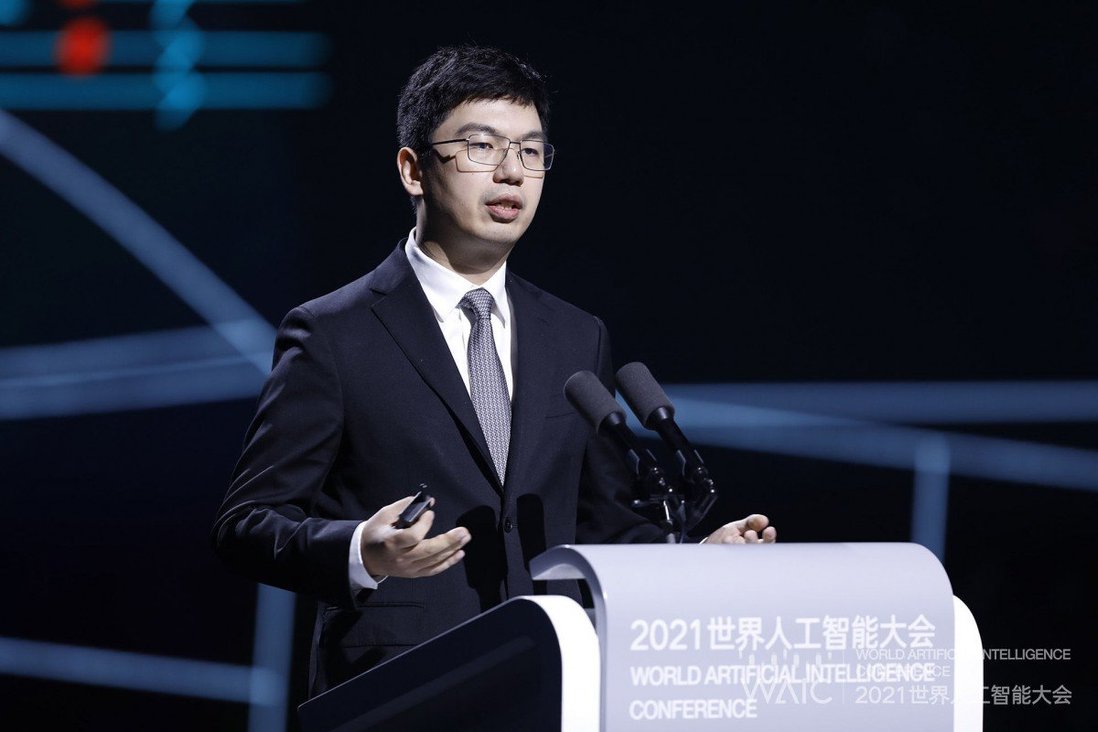
Xu Li, Co-founder and CEO of SenseTime presented his view on AI ethics during World Artificial Intelligence Conference 2021
There is no doubt that Artificial Intelligence (AI) is capable of unleashing untapped potential in businesses, economies and our lives. On one hand, the high degree of smart decision-making and automation is rapidly transforming traditional industries. On the other, the nature of AI development is expanding the boundaries of fundamental scientific research to enable new value creation, support new ideas and foster new business models.
A case in point is China, where AI technology is being harnessed to accelerate the efficient use and distribution of resources amid rapid digitalisation across the country. A fast-growing population in a city result in competition for resources, which can directly impact on the quality of life for its residents. Such resources include education, healthcare, and other public services. Considering 68 per cent of the world’s population is projected to live in urban areas by 2050 according to the United Nations, this is a challenge which urban planners must address today.
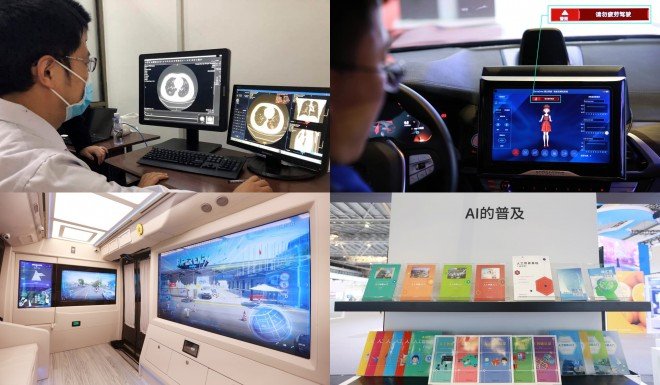
The rapidly growing applications of AI technologies have been empowering various industries including healthcare, intelligent automobile, augmented reality, education, etc
As AI continues to rapidly evolve, it begs the question of how it can be harnessed for the greater good, and importantly, not fall into the mercy of abuse or misuse. Ethics clearly has a role but without guiding principles, it becomes nothing more than just a concept.
China’s National Governance Committee for the New Generation Artificial Intelligence advocated developing responsible AI in 2019, including eight tenets, namely harmony and friendliness, fairness and justice, inclusiveness and sharing, respect for privacy, security and controllability, shared responsibilities, open cooperation, and agile governance. In many ways these parallel proposed principles come from SenseTime, a leading global AI software company headquartered in Hong Kong.
Speaking at 2021 World Artificial Intelligence Conference, the world’s flagship AI conference, SenseTime’s co-founder and CEO, Xu Li, shared his views on the importance of promoting fairness in AI applications.
Xu believes that AI governance, and the technology’s development, require a continual balancing process involving multiple goals and dimensions. Relevant regulation must be founded upon controllable technology, along with a human-centric, sustainable, and balanced development process which upholds ethics.
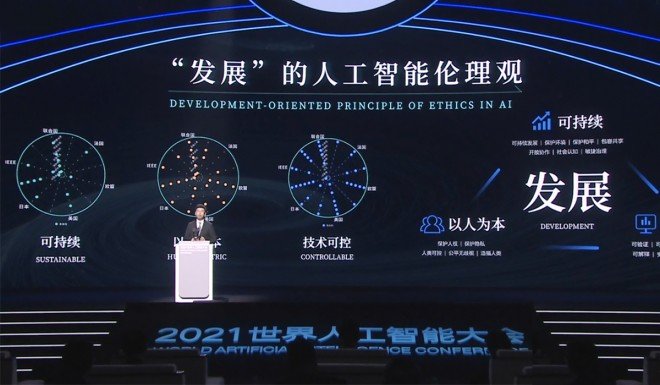
Xu Li addressed that AI ethics governance should uphold balanced objectives of human-centric, controllable, and sustainable AI development
As a matter of fact, SenseTime does not seem to shy away from tackling these challenges head on. Earlier last year it teamed up with the Qing Yuan Research Institute of Shanghai Jiao Tong University, to publish a “Code of Ethics for AI Sustainable Development”, which proposes three fundamental principles.
1. Human-centric approach
Proponents will agree the purpose of AI is to augment humans and create new value. This has become a common topic for discussion from the United Nations to major economies including China and the European Union. Policy makers around the world have spent efforts to come up with measures to shape this goal. Measures range from human rights and privacy protection, sustainability, environmental protection, inclusiveness, and openness, to name a few.
Also under this pillar is education, as a means to nurturing the next generation through AI. In Hong Kong, SenseTime has partnered with schools to provide an AI curriculum and learning platform to equip young people with the skills to shape the technology in the future.
Xu believes digital inclusiveness, where digital ethics built on a value system across different cultures, is worth pursuing. He adds that services realised by AI use must be relevant for an entire community and not be limited to a few select groups.
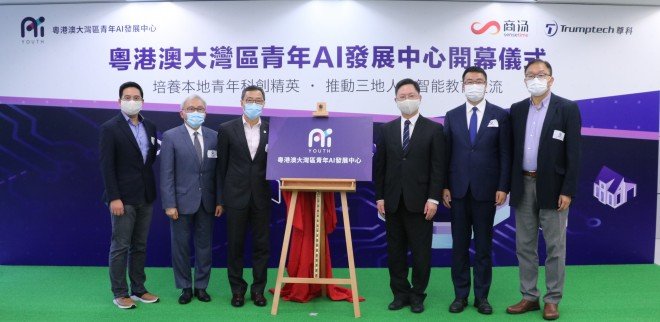
SenseTime launched Guangdong-Hong Kong-Macao Greater Bay Area Youth AI Development Center in March 2021, aiming to cultivate the next generation of AI specialists in the region
2. Controllable technology
Considering AI technology could be what one day drives us around, safety is a critical hygiene factor. Regulators around the world are already looking at AI’s different attributes from verifiability to legality, creditability to responsibility. Only in February, German regulators set out its expectations on autonomous vehicles.
However, it seems that the concept of controllable technology is as much about objective criteria as subjective determination. Xu argues that it is also important to allow people to understand the use and the possible risk of the technology. People, or the market, will ultimately decide for themselves whether or not to adopt it.
3. Sustainability
With COP26 around the corner, sustainability has become the topic du jour. This is another area where AI can play an active role in positively contributing to our planet. According to business consultancy, BCG, AI technology can deliver a positive impact in sustainability. In a paper published earlier this year, the consultancy found that to meet the goal of limiting the increase in average global temperatures to 1.5 degrees Celsius as specified in the 2016 Paris Agreement, the world must reduce greenhouse gas (GHG) emissions by 50 per cent.
“In our experience with clients,” reads the report, “using AI can achieve 5% to 10% of that needed reduction—between 2.6 and 5.3 gigatons of carbon dioxide equivalent.” The paper adds that the application of AI on sustainability could boost productivity by up to US$ 2.6 trillion.
An advocate of a goal-based approach to development, Xu believes that AI ethics governance should be promoted to holistically facilitate the fact that AI will better serve the wider community and enhance societal development. But the focus on any single parameter, he warns, could allow an otherwise virtuous action to go astray.
Given the rapid development of AI technology, it is necessary to set guidelines and principles to ensure it remains human-centric, sustainable, and ethical. Meanwhile, there is a suggestion that regulators must be open enough to balance the needs of regulating its development with the development itself. On this front, SenseTime openly works closely with governments, industries, academics, research institutes, and users to explore different governance models.
On the world stage, SenseTime works closely with the United Nations and its development agency, the United Nations Development Programme (UNDP), to explore the roles of new technologies, including AI, AR, and Internet of Things, in the drive towards the UNDP’s 17 Sustainable Development Goals. On the academic front, the company has also collaborated with leading educational institutions in the field. Earlier this year, it joined hands with the School of Public Policy and Management of the Tsinghua University in Beijing to explore the sustainable use of AI. In March 2021, SenseTime and the Shanghai Jiao Tong University set up the SJTU Computational Law and AI Ethics Research Center to collaboratively strengthen research in AI ethics.
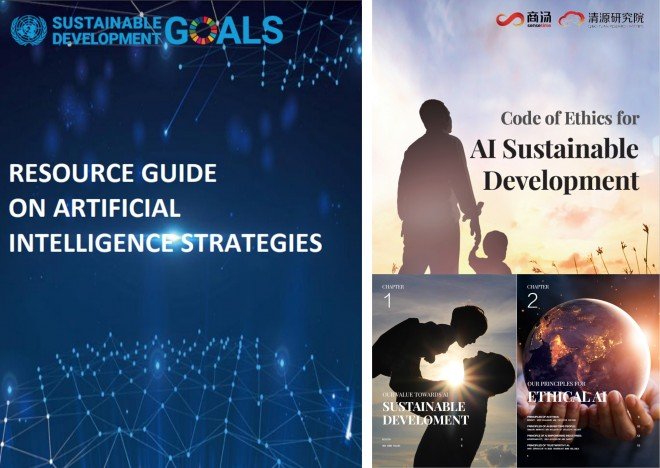
In late June 2021, SenseTime’s whitepaper on the “Code of Ethics for AI Sustainable Development” was included in the “Resource Guide on Artificial Intelligence Strategies” released by the UN DESA
Its whitepaper on the Code of Ethics for AI Sustainable Development was included in the Resource Guide on Artificial Intelligence Strategies released recently by the United Nations Department of Economic and Social Affairs. No recognition is more significant than one from the United Nations.
Similarly, Mr. Xue Lan, Professor and Dean of Schwarzman College, Tsinghua University, also believes the company is making the right moves, “Although it is a moving target given how quickly the technology is evolving, it is encouraging to see companies such as SenseTime take the step to collaborate with the wider ecosystem, contribute to AI governance and commit to shaping its development for the greater social good.”
As we begin to look further ahead it is clear that the sustainable development of AI technology will be predicated on ethical principles as well its ability to benefit humanity, our economy and planet. Regulation will be increasingly important, as will policy makers’ collaboration with industry and academia.







 Return
Return